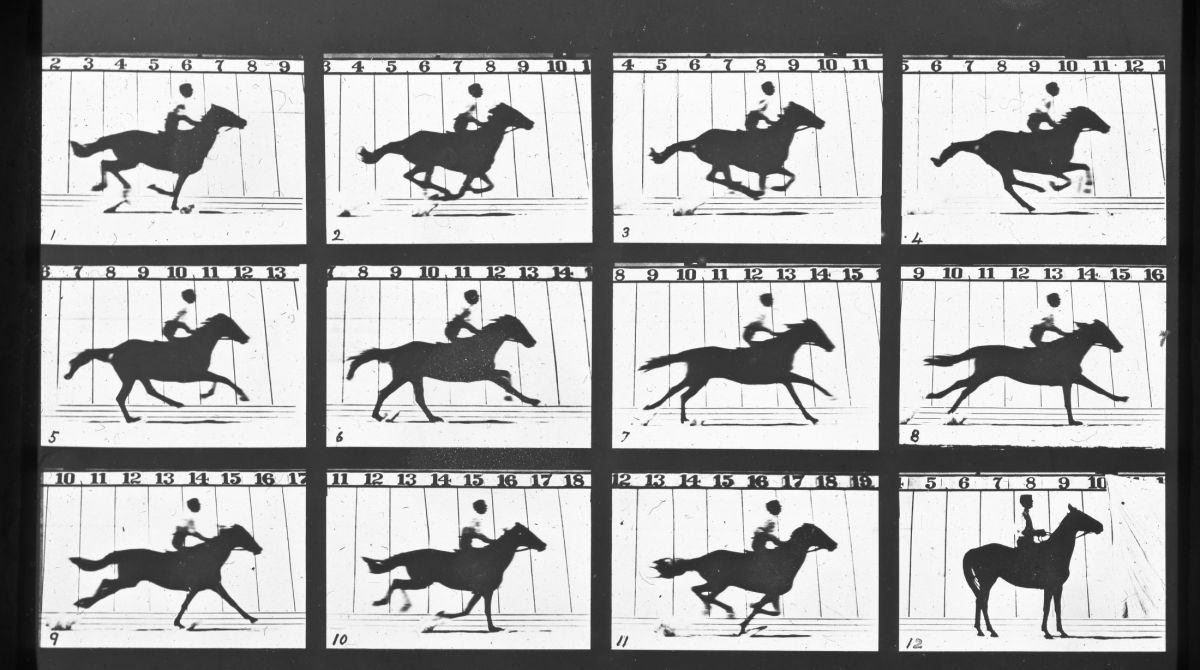International conference celebrates work of moving image pioneer Eadweard Muybridge and relocation of personal archive of his work to Kingston University
Posted Friday 31 March 2023
 Eadweard Muybridge lived in Kingston upon Thames for the first part of his life before gaining international fame in 1878 when he took a series of photographs of moving horses.
Eadweard Muybridge lived in Kingston upon Thames for the first part of his life before gaining international fame in 1878 when he took a series of photographs of moving horses.
World-renowned experts in the life and times of photographer and moving image pioneer Eadweard Muybridge have come together to share their latest research at an international conference hosted by Kingston University.
The Moving Muybridge: Transatlantic Dialogues conference was organised by Kingston University's Visual and Material Culture Research Centre in partnership with Kingston Museum and the Stanley Picker Gallery. The conference, which was funded by the Terra Foundation for American Art, saw eminent Muybridge scholars descend on the University's flagship Town House building for a series of lectures, presentations, discussions and films. The two-day event marked the recent relocation of Kingston Museum's Muybridge Collection to a purpose-built archive at the University's multi-award winning Town House.
Born in 1830, Eadweard Muybridge lived in Kingston upon Thames for the first part of his life before gaining international fame in 1878 when he took a series of photographs of moving horses in California. It was the first time a photographer had captured such precise real-time motion. His ground-breaking work, in which he used multiple cameras to capture movement, saw him become globally renowned.
He also invented the Zoopraxiscope – a device for displaying moving images that is considered an important predecessor to the movie projector – and his innovation is credited as paving the way for cinema and animation. On his death in 1904 he entrusted his personal collection of equipment and prints to Kingston Museum, leaving an extensive body of work to the borough.
 Academics at the Muybridge Conference to mark the recent relocation of Kingston Museum's Muybridge Collection to a purpose-built archive at the University’s Town House.New research showcased at the conference, which was funded by the Terra Foundation for American Art, highlighted the ongoing relevance of Muybridge's work in the 21st Century. Speakers included Toronto Metropolitan University Emeritus Professor Marta Braun, the Cantor Arts Center's Maggie Dethloff, award-winning filmmaker Marc Shaffer and Professor Byron Wolfe from the Tyler School of Art and Architecture at Temple University, Philadelphia.
Academics at the Muybridge Conference to mark the recent relocation of Kingston Museum's Muybridge Collection to a purpose-built archive at the University’s Town House.New research showcased at the conference, which was funded by the Terra Foundation for American Art, highlighted the ongoing relevance of Muybridge's work in the 21st Century. Speakers included Toronto Metropolitan University Emeritus Professor Marta Braun, the Cantor Arts Center's Maggie Dethloff, award-winning filmmaker Marc Shaffer and Professor Byron Wolfe from the Tyler School of Art and Architecture at Temple University, Philadelphia.
Professor Braun's lecture examined Muybridge's Animal Locomotion and the role it played in overturning high modernist art. "From the 1960s Animal Locomotion was used by artists to question the very nature of the photograph and the role of the viewer in generating the meaning of any work of art," she said. "Muybridge's photographs, never out of print, were created out of his concern for bodies in space and time. His influence today can be felt through artists working in painting, sculpture, photography, film and performance who sustain an interest in the body and in movement."
Kingston Museum curator Seoyoung Kim, who has been instrumental in organising the archive move, used her conference address to reflect on the projection lectures Muybridge had delivered around the globe. "Muybridge toured the UK, America and Europe for more than 15 years, showcasing his pioneering photographs and moving image projection in a lecturing career that is often overlooked," she said. "The Museum's Muybridge collection, now stored at the University, is one of the largest and most important of its type in the world, even including his only moving image projector the Zoopraxiscope." Other features of the collection include an extensive holding of lantern slides and Muybridge's intricately curated scrapbook.
Conference organiser Professor Fran Lloyd, from Kingston School of Art, said it had been a fitting way to acknowledge Muybridge's achievements and raise awareness of their lasting importance. "It was particularly significant the conference was held in Kingston where Muybridge spent his last years, Kingston Library and Museum were built with financial support by the Scottish-American industrialist and philanthropist Andrew Carnegie, which would have inspired Muybridge's donation of the collection to the borough," she said.
Muybridge had been a meticulous man, aware of his own legacy and how his work would be presented to the public, Professor Lloyd explained. "The conference and renewed focus on this world-class archive have enabled us to highlight the importance of local history and the unique artefacts museums and archives hold," Professor Lloyd said. "The collection is now more readily assessable to researchers and scholars who can review the wealth of material it contains in its new home at Town House, while visitors can continue to find out more about Muybridge's innovation and impact in the public display on show at Kingston Museum."
- Find out more about the Moving Muybridge: Transatlantic Dialogues Muybridge conference.
- A selection of material from the Eadweard Muybridge collection is on public display at Kingston Museum. All items stored at the University Archives require appointments to view.
Contact us
General enquiries:
Journalists only:
- Communications team
Tel: +44 (0)20 8417 3034
Email us



